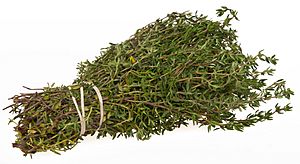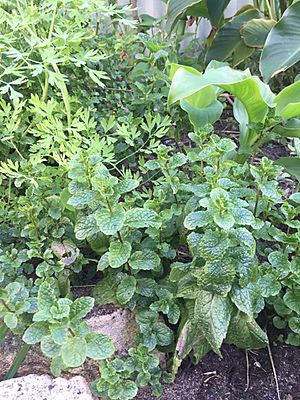Herb facts for kids

Herbs are special plants that people grow for many reasons. We use them as food, especially to add flavor to our meals. Some herbs also help treat diseases or make us feel better. Others are used for their pleasant smell or for spiritual purposes.
The word "herb" comes from the Latin word herba, which means grass or green stalks. Scientists often use "herb" to mean any plant with soft, juicy stems. However, most people think of herbs as plants that are useful in some way, like for cooking or medicine.
Herbs are usually small plants. When they are young, their stems are soft and juicy. As some herbs get older, their stems can become harder and more woody.
Many herbs are perennials. This means the top part of the plant dies back each year, but the roots stay alive underground. New plants then grow from these roots the next year. Some herbs are annuals. They only live for one growing season and need to be planted from seed every year.
Uses of Herbs

You can use the leaves, stems, or seeds of herbs. They can be used fresh, or you can dry them to use later. Dried herbs can be ground into a fine powder and stored in airtight containers.
Many herbs are used in cooking to make foods taste better. For example, basil and thyme are popular for flavoring dishes. Other herbs are used to create nice scents for perfumes. Still others are important for making medicines.
Some herbs are valued for their leaves, like balm and sage. Saffron comes from the buds and flowers of a plant. Fennel seeds are great for seasoning and relishes. Vanilla flavoring comes from the fruit pods of the vanilla plant. Ginseng is prized for its roots, which have a strong smell.
Growing Herbs at Home
Many people enjoy growing herbs in their gardens. Some gardeners like to create beautiful patterns with different herb plants. Others grow herbs mainly to add fresh or dried flavors to their food.
Herb seeds and young plants are usually not expensive, and they grow quite easily. If you don't have a big outdoor garden, you can grow most types of herbs in pots or containers.
Many herbs can also grow well indoors. They don't need a lot of special care. To grow herbs, plant them in good soil that has been prepared well. Choose a sunny spot, perhaps near a window, where they can get plenty of light.
Related pages
Images for kids
-
Herb garden at Hardwick Hall, Derbyshire, England, originally planted in the 1870s by Lady Louisa Egerton, recreated by the National Trust, largely following the original design.
-
Nicholas Culpeper was an English botanist, herbalist, physician, and astrologer. (etching by Richard Gaywood between 1644 and 1662)
See also
 In Spanish: Hierba para niños
In Spanish: Hierba para niños
 | Jessica Watkins |
 | Robert Henry Lawrence Jr. |
 | Mae Jemison |
 | Sian Proctor |
 | Guion Bluford |





